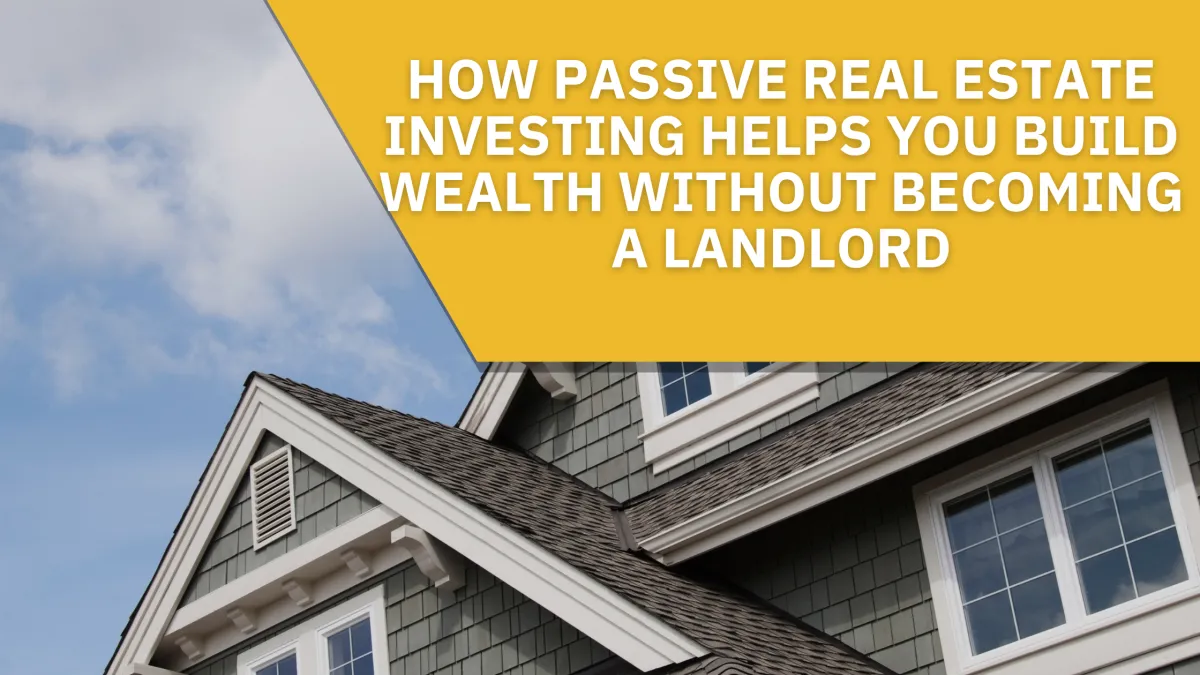Blog

How Passive Real Estate Investing Helps You Build Wealth Without Becoming a Landlord
I’ll admit it—when I first thought about investing in real estate, the image that popped into my mind wasn’t exactly appealing.
I pictured myself getting a call at 2 a.m. because a tenant’s toilet was overflowing. I imagined chasing down late rent checks, arguing with contractors, dealing with repairs, and all the other horror stories you hear from landlords. And as a full-time engineer with a busy life and a family, I knew I didn’t want to add “property manager” to my resume.
But at the same time, I couldn’t ignore the facts. Over the years, I kept hearing the same thing from books, podcasts, and mentors: real estate was one of the most reliable ways to build wealth.
I felt stuck. I wanted the benefits of real estate—the cash flow, the appreciation, the tax advantages—but I didn’t want the headaches of managing properties.
Then I discovered passive real estate investing.
Passive investing was a game changer for me. It gave me a way to invest in large, professionally managed real estate deals without becoming a landlord. And it opened the door to building wealth in a way that fit my life, my skills, and my goals.
If you’ve ever felt the same tension—wanting the upside of real estate but not the stress—this is for you.
Here’s how passive real estate investing can help you build wealth without becoming a landlord.
1. You invest in the property, but you don’t manage it.
In a passive real estate investment, you’re not the one dealing with tenants, maintenance, or day-to-day operations. Instead, you’re a limited partner in a deal managed by an experienced operator or sponsor. The operator handles everything: acquiring the property, improving it, managing it, and eventually selling it.
You still own a piece of the property. You still share in the income and the profits. But you’re not the one getting the phone calls or dealing with the logistics.
For someone like me—who values systems, delegation, and leverage—this was exactly what I was looking for.
2. You gain access to larger, more stable assets.
When I looked at investing in real estate on my own, I realized I’d be limited to buying small properties: maybe a single-family rental or a small duplex.
But through passive investing, I could participate in much larger deals: 50-unit, 100-unit, or even 300-unit apartment complexes. These bigger properties aren’t just more impressive—they’re often more stable.
If you own a single-family rental and your tenant moves out, your income drops to zero. But if you own a piece of a 100-unit building and one tenant moves out, it barely makes a dent.
Larger properties also attract professional management, institutional financing, and economies of scale that aren’t available to small landlords.
3. You can leverage the expertise of experienced operators.
One of the things that held me back from real estate early on was fear. I didn’t know how to find good properties. I didn’t know how to negotiate deals or manage renovations or hire the right people.
With passive investing, I didn’t have to figure it all out myself. Instead, I could partner with operators who had a track record of success, who had already done dozens of deals, and who had teams and systems in place.
That doesn’t mean handing over your money blindly—it means vetting the operator, understanding the business plan, and then trusting the professionals to do what they do best.
4. You still get the financial benefits of ownership.
Here’s the part that really sold me: passive investing doesn’t mean giving up the financial upside. You still get:
A share of the rental income (distributed monthly or quarterly)
A share of the profits when the property sells
The tax benefits of ownership, like depreciation (which can offset other income)
In other words, you get the benefits of owning real estate—income, appreciation, tax advantages—without the active responsibilities.
5. You free up your time to focus on what matters most.
The biggest benefit, for me, wasn’t just financial. It was time.
Passive real estate investing allowed me to build wealth without sacrificing evenings, weekends, or family time. It allowed me to focus on my engineering career, my family, and my personal goals—knowing that my investments were working in the background.
Instead of becoming a landlord, I became an investor. And that shift made all the difference.
Today, I’ve built a portfolio of passive investments that generate income and grow in value—all without adding more work to my plate. And I’ve made it my mission to help other busy professionals, engineers, veterans, and high earners do the same.
Because let’s be honest: you’re already working hard. You don’t need another job. You need a system that works alongside you, not against you.
If you’ve been holding back from real estate because you don’t want to be a landlord, I hope this shows you there’s another way. A smarter way. A way that leverages the expertise of others while giving you ownership, income, and control.
Passive real estate investing isn’t for everyone. It requires trust, patience, and due diligence. But for me—and many others—it’s been a path to building wealth without building more work.
If you’re curious about how passive investing could fit into your financial plan, I’d love to connect.
If you’re ready to explore passive real estate investing or want to learn how this strategy could help you build wealth without the burden of property management, visit www.wintercapitalllc.com or book a free strategy call. Let’s talk about how we can help you take the next step toward financial freedom.

